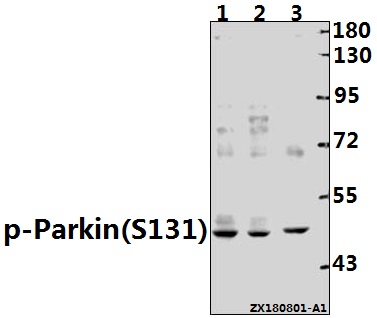Product Name :
Parkin (phospho-S131) polyclonal antibody Background :
Parkin is a zinc-finger protein that is related to ubiquitin at the amino terminus. The wild type Parkin gene, which maps to human chromosome 6q25.2- 27, encodes a 465 amino acid full-length protein that is expressed as multiple isoforms ranging from 50-58 kDa. Mutations in the Parkin gene are responsible for utosomal recessive juvenile Parkinson’s disease and commonly involve deletions of exons 3-5. In humans, Parkin is expressed in a subset of cells of the basal ganglia, midbrain, cerebellum and cerebral cortex, and is subject to alternative splicing in different tissues. Parkin expression is also high in the brainstem of mice, with the majority of immunopositive cells being neurons. The Parkin gene has been identified in a diverse group of organisms including mammals, birds, frog and fruit flies, suggesting that analogous functional roles of the Parkin protein may have been highly conserved during the course of evolution Product :
Rabbit IgG, 1mg/ml in PBS with 0.02% sodium azide, 50% glycerol, pH7.2 Storage&Stability :
Store at 4°C short term. Aliquot and store at -20°C long term. Avoid freeze-thaw cycles. Specificity :
Parkin (phospho-S131) polyclonal antibody detects endogenous levels of Parkin protein only when phosphorylated at Ser131. Immunogen :
Synthetic peptide derived from human Parkin around the phosphorylation site of S131. Conjugate :
Unconjugated Modification :
Phosphorylation
Parkin (phospho-S131) polyclonal antibody Background :
Parkin is a zinc-finger protein that is related to ubiquitin at the amino terminus. The wild type Parkin gene, which maps to human chromosome 6q25.2- 27, encodes a 465 amino acid full-length protein that is expressed as multiple isoforms ranging from 50-58 kDa. Mutations in the Parkin gene are responsible for utosomal recessive juvenile Parkinson’s disease and commonly involve deletions of exons 3-5. In humans, Parkin is expressed in a subset of cells of the basal ganglia, midbrain, cerebellum and cerebral cortex, and is subject to alternative splicing in different tissues. Parkin expression is also high in the brainstem of mice, with the majority of immunopositive cells being neurons. The Parkin gene has been identified in a diverse group of organisms including mammals, birds, frog and fruit flies, suggesting that analogous functional roles of the Parkin protein may have been highly conserved during the course of evolution Product :
Rabbit IgG, 1mg/ml in PBS with 0.02% sodium azide, 50% glycerol, pH7.2 Storage&Stability :
Store at 4°C short term. Aliquot and store at -20°C long term. Avoid freeze-thaw cycles. Specificity :
Parkin (phospho-S131) polyclonal antibody detects endogenous levels of Parkin protein only when phosphorylated at Ser131. Immunogen :
Synthetic peptide derived from human Parkin around the phosphorylation site of S131. Conjugate :
Unconjugated Modification :
Phosphorylation
-
 Western blot (WB) analysis of p-Parkin (S131) pAb at 1:500 dilution Lane1:MCF-7 whole cell lysate(40ug) Lane2:HCT116 whole cell lysate(40ug) Lane3:SGC7901 whole cell lysate(40ug)
Western blot (WB) analysis of p-Parkin (S131) pAb at 1:500 dilution Lane1:MCF-7 whole cell lysate(40ug) Lane2:HCT116 whole cell lysate(40ug) Lane3:SGC7901 whole cell lysate(40ug)
Bioworld Biotech only provide peptides for our antibodies and do not provide additional peptide customization services.
Price/Size :
USD 368/1mg/vial
Tips:
For phospho antibody, we provide phospho peptide(0.5mg) and non-phospho peptide(0.5mg).Describe :
Blocking peptides are peptides that bind specifically to the target antibody and block antibody binding. These peptide usually contains the epitope recognized by the antibody. Antibodies bound to the blocking peptide no longer bind to the epitope on the target protein. This mechanism is useful when non-specific binding is an issue, for example, in Western blotting (WB) and Immunohistochemistry (IHC). By comparing the staining from the blocked antibody versus the antibody alone, one can see which staining is specific; Specific binding will be absent from the western blot or IHC performed with the neutralized antibody.Formula:
Synthetic peptide was lyophilized with 100% acetonitrile and is supplied as a powder. Reconstitute with 0.1 ml DI water for a final concentration of 10 mg/ml.The purity is >90%,tested by HPLC and MS.
Storage:
The freeze-dried powder is more stable. For short time at 2-8°C. For long term storage store at -20°C.
Note :
This product is for research use only (RUO only). Not for use in diagnostic or therapeutic procedures.
 Parkin (phospho-S131) polyclonal antibody
Parkin (phospho-S131) polyclonal antibody  Datasheet
Datasheet COA
COA MSDS
MSDS SHIP
SHIP